‘The soil in our area is Red Mud, RED-BLOODY-MUD.
It drives me mad … It’s the only place in the world where you can be bogged down in mud up to your neck and get dust in your eyes.’
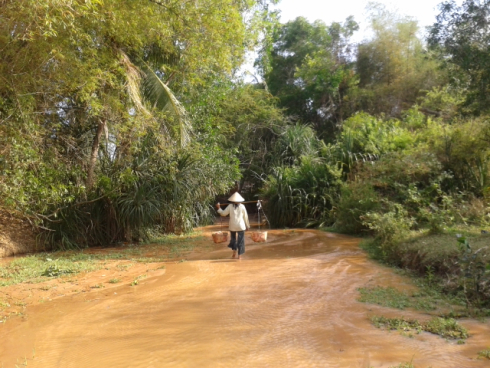
In tribute to my uncle and his inspirational life
When I went back to Vietnam after 14 years of absence, I found a powerful source of inspiration: an extraordinary family story that I knew nothing about. I immediately felt the urge to pay tribute to my uncle, my mother’s brother, whose inspirational life has made me want to write. I started to ask him some questions about his past and one thing leading to another, he slowly opened his heart, talking about his memories, his fears, his hopes, and his life, before, during and after the Vietnam War (1955-1975).
When I started the interview, I could feel his hesitation, his answers were short and punctuated by long silences. I thought I’d better stop, maybe it was a bad idea to bring up the past. But I looked at him and spotted a sparkle in his eyes. He began to smile and his face suddenly enlightened. He just needed time to put his memories into words.
He started to recall his childhood, his youth and his strong commitment to a cause he thought was right. I realised that he had never confided in anyone about this chapter of his life. I felt extremely grateful and privileged to be the one to hear it.
The story that follows modestly relates the time of his commitment in the Vietnam War in 1973 as a South Vietnamese officer, fighting alongside the Americans. It is based on his true story and real facts, although I’ve brought my personal style.
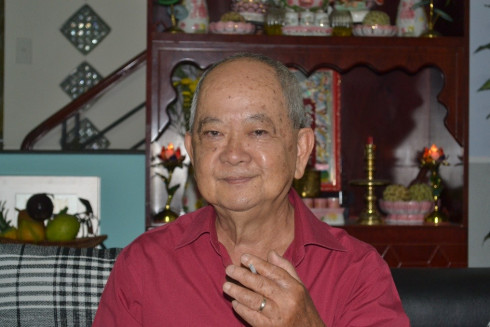
I dedicated 10 years of my life to the war: five years to the famous School of the Officers in Thu Duc in Vietnam, two years fighting at the front and three years as a prisoner in a labor camp in the hands of the Communists. Ten years in a lifetime seems little, but these ten years have changed my life forever.
My name is Hoàn, I am Vietnamese born in Phnom Penh in Cambodia. The second son of a family of three children, my father worked at the French embassy and my mother was a French teacher. We were mostly immersed in French culture, the tricolour presence at that time was dominant in what used to be called “l’Indochine” (Indochina: Vietnam, Laos, Cambodia). From this family heritage, I can speak Vietnamese, French and English, languages that I learned when I fought alongside the Americans during the Vietnam War in 1973.
I was born with a natural appetite for culture and knowledge, literature, music, Medicine, Law, languages, and everything that came from overseas used to fascinate me so much in my younger years.
Cambodia during my childhood was peaceful and quiet. King Sianouk was the king at the time and he has always been tolerant toward the Vietnamese community. I was fortunate enough to get a solid education. I went to a French school and graduated from University majoring in Medicine. I had the best time over there, probably the best years of my student life. I met an exceptional Cambodian professor who became the most brilliant Minister of Culture that Cambodia has ever had. I loved this oblivious and happy life and yet, I decided to leave everything behind. I made the decision to join the army and fight in Vietnam. How to keep living a quiet life in Cambodia when my homeland is put to fire and the sword? At the age of 25, it was time for me to find a purpose in my life.
23 January 1967, Phnom Penh. Departure to Vietnam.
I left without turning back. Jaws tight, with a heavy heart but determined and committed to my purpose. I got accepted to the prestigious School of Officers in Saigon. My mother, like all mothers, cried all her tears at the idea of her son not coming back; my father, with his usual self-control, gently tapped my shoulder.
“Do what you have to do brother, I will join you later. If we both go now, we’re going to kill her,” said my older brother, the “hothead” of the family and looking at my mother in tears.
“You will come back big brother, right? You’re only going for holidays?” asked my little sister, who is seven years apart in age and too young to realise.
The picture of my father, when I told him I would fight alongside the Americans, the antithesis of his convictions, still haunts me today. In his eyes, I read the deep sadness and the strong disappointment from a father, powerless towards his son’s irrevocable decision.
March 1973, Châu Dôc Front – South Vietnam.
The war is raging. From one side, the North and its popular army and the “Front de libération” of the South called “Vietcongs”, and from the other side, the South-Vietnamese troops supported by the Americans.
The sound of the bullets whistles in my ears and yet, I am not fighting on the front line. I can hear my companion soldiers yelling to give us some courage and attack the “enemy.” At the back, holding a radio in my sweaty hands, I am in charge of reporting every combat scene to my superiors. I don’t know what is worst. Watching my dear companions getting shot or keeping my self-control and accomplishing my official duty. To inform, to get commands, to obey, and make sure the orders are applied. This is what war is about, a succession of obligations coming from the top. And at the bottom stand the soldiers, the ones who kill, and the ones who die.
25 April 1974, Chàu Dòc, 8 pm.
A thousand clapping hands resonate in the big room of the army camp. I hear the cheerful whistles of my companions, impatient to see on stage the beautiful Khanh Ly, an emblematic and engaged Vietnamese singer who came to support the troops. The Asian Joan Baez in a way. It feels so good to hear the soldiers laughing, the yells, the sound of the glass of beers banging together, the thundering voices of the fervent soldiers and to feel a jubilation warming up our hearts numbed by the cold of the war.
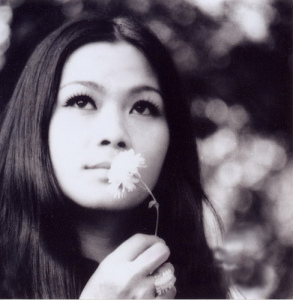
1st May 1975 – Saïgon.
The American troops are pulling out. Vietnam endures a reunification on the authority of the North. The Communist are coming to power and rename Saïgon, Ho Chi Minh City. In a complete rout, the Americans are leaving, distraught Vietnamese people take refuge to the American embassy with the hope to be evacuated by plane. My superior, the captain J. whispers in my ear: “Hoàn, your place is not here anymore, we can send you to America and get you the status of ancient officer. You will be able to live a quiet and comfortable life other there.” I firmly reply: “Thank you, I really appreciate your help. but my place is here, in Vietnam, beside my comrades in arms and my family, until my last breath”.
The Vietcongs have won. We have lost. When my troop had been taken by storm by the Communists, I did not fight back, just lowered my head, my weapon, and gave the order to my soldiers to surrender. Penned in a big truck with other prisoners, they are taking us to a labor camp hidden in the forest, somewhere in the North of Saïgon. (I still don’t know today where it is). I can picture the procession of torture imposed on “traitors to the motherland”: brainwashing, extortion of admissions and more… but I am not losing my hope. Hope is all I have left.
5 June 1975, labor camp, 5 am
“Hoán, wake up!” My cell comrade pulls me out of my sleep. I can barely open my eyes. It’s time to do our collective gymnastics in the main foyer of the camp where more than a thousand prisoners are squeezed to work out and “keep in shape.” I can hear the stomachs rumbling, craving for the two sweet potatoes, the manioc root and the small piece of fish that constitutes our meal of the day.
We’re heading to the forest to cut some trees. Huge trunks, bamboo stems, bulrush we have to collect to build the shack, cover the roof and make the straw mattress for our beds. Carrying enormous burden on our shoulders, bringing tree trunks using the force of our arms, with an empty stomach, weakens the strongest of us. The hardest to endure is the lack of food.
21st December 1975, Labor camp, 6 pm.
It’s time for our regular “brainwash”, poor lost souls that we are, the pariah who have disowned our homeland to join forces with the enemy. As usual, we are gathered in the main foyer to attend the political class about the good deeds of communism. Today it’s the apology of Karl Marx and Marxism. At the end of the class, our professor asks to stand up and shout: “Communism is the only regime that can save our country!” Like robots, we all repeat a sentence that does not mean anything to me.
15th April 1976, Labor camp, 2 pm.
“Hoán, mail is here!” yells the prison guard. On the envelope stamp, I read “France”. A smile enlights my face. It’s my little sister, Dung (Eva is her French name), the youngest of the family that my father has sent to France so she can build a new and safe life. In the letter, she says she has given birth to a healthy little boy. She’s named him Christian, Hanh in Vietnamese. A happy event that appeases the excruciating pain of having lost my older brother, shot on an immaculate beach in the center of Vietnam in Summer 1972. He also joined the army to fight alongside the Americans a few months after me…
In my misfortune, I consider myself lucky. Life at the camp is very hard but we are not mistreated. I have even managed to find my own place, to adapt myself to a hostile environment and to establish a contact with my jailers. Many of them ask me to teach them French and English. During our free time, we read, we draw, we build instruments with wood and bamboo. I’ve discovered that the camp shelters an educated and cultured elite: intellectuals, architects, doctors, former ministers. My aptitude for foreign languages gets the attention and the curiosity of the leaders, step by step I have won their trust and esteem. I remember this corporal sergeant who could not stop asking me to recite Guillaume Apollinaire’s poem: “l’Automne est mort” (Autumn is dead).
16th June 1978, Labor camp, 8 pm.
The railings of the main gate open. But this time it’s different. They’re not opening to go to the forced work in the dark forest but to offer me something that I have cherished like a lost treasure: my freedom.
My exemplary behaviour during these last three years of detention got my jailors to free me, with a few of my comrades. I feel like a child who’s been rewarded for having done something good. In the truck that brings me back to Ho Chi Minh City, Saïgon in my heart, I realise that everything is over. Strangely enough, this war that I have hated so much has been the purpose of my life. It has allowed me to move forward and to bear the pain of losing my brother in 1972 and my father in April 1976. This inner strength, with its weaknesses, has guided me during all these years. I thought that I endured the worst but getting back to a “normal” life seems as frightening to me. I hope to keep my head clear and find again the peace of a life tormented by the war for too long.
Vietnamese New Year (Têt) 2008, Cambodia.
It’s my first pilgrimage in Cambodia, my country of heart and where I was born, after 40 years of absence. An initiatory trip that I haven’t had the courage to do earlier. I am getting teary-eyed when I see, as I am crossing the border between my two countries, the alley of palm trees where I used to walk when I was a child.
Everything has changed and the house of my childhood does not exist anymore. But I can still feel an imperceptible breeze of days gone by, only palpable by myself and probably by a subjective memory. The country is healing its wounds, I cannot compare the horror of the Cambodian genocide to the trauma of the war in Vietnam.
But one thing is sure, I will carry, forever in my heart, the country of my happy childhood. No regret, no bitterness, only an immense gratitude towards life that has brought me all these exceptional experiences and enriching encounters.
******
April 2014, Ho Chi Minh City, Vietnam.
Hoàn is 72 years old today. He has managed to go back to a “normal life” and has kept his head still filled with the souvenirs of a vivid past. His memory has stayed untouched, so have his convictions. Married, father of two daughters and a son, he has six grandchildren who love him deeply. He is still teaching English to a new generation of students and lives a peaceful life in the suburbs of Saïgon. Every now and then, he spends the weekend in our family house on the shore of the Mekong River. He loves going there to rest, read, sleep in the hammock in the shadow of a palm tree. But what he loves the most is fishing in the little river near our home. Patience and silence is his philosophy of life. “Never complain, explain sometimes” is his motto.
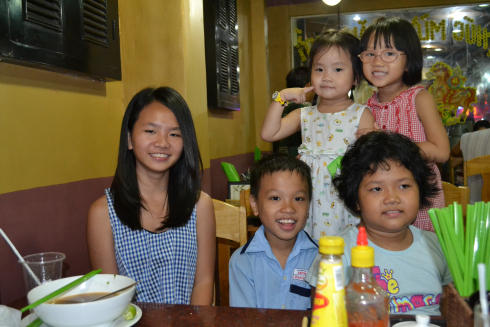
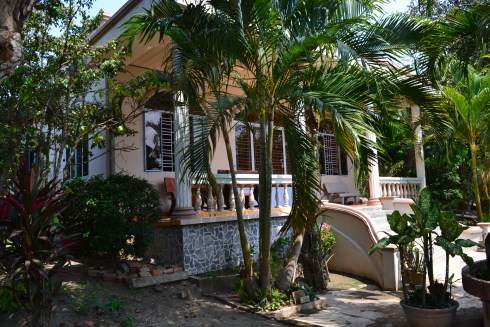
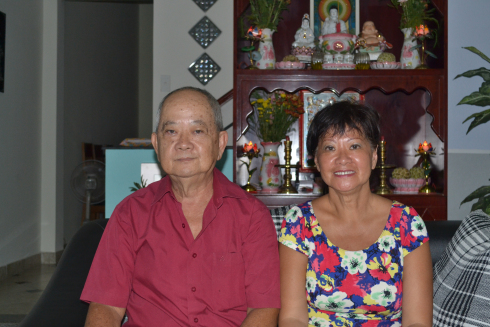
I consider myself very privileged to have witnessed my uncle telling his story. There are so many questions I would like to ask but I feel it’s time to stop now. I have to leave him with his secrets and his beautiful reticence. I wanted to ask him why he decided to fight alongside the Americans, against his father’s will and the majority of the Vietnamese people… but then I realise it was not the point. From one side to the other, from a conviction to another, the consequences of the war stay the same for everyone who experienced it.
But above all, when he confessed these few words that I knew were the truth: “I have not killed”, it touched me so deeply that a tear rolled down my cheek.
Thank you, my dear uncle. Live and be happy forever.
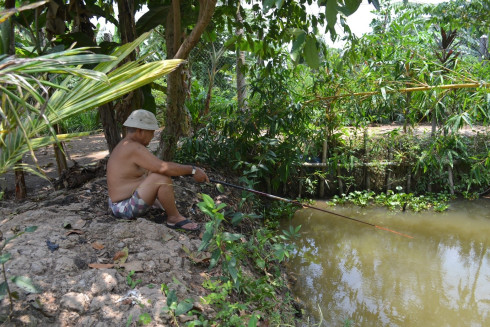

Wow amazing story 🖤
LikeLiked by 1 person
Thank you Ezra 🙂
LikeLike